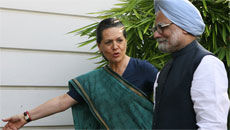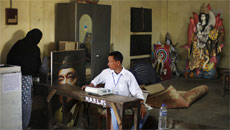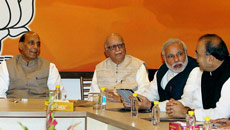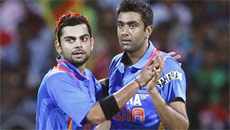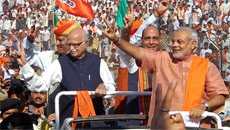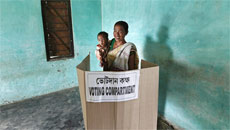Some 120 million people Thursday voted in 14 states and union territories in a critical third phase of general election to pick 91 of the 543 MPs, including seven from the seat of power in New Delhi whose control is considered vital for any party to rule India.
In what could be called a carnival of democracy, men and women cutting across social and economic strata poured into 140,850 polling centres from the time they opened at 7 in the morning for the 11-hour balloting.
The entire exercise, involving tens of thousands of staff and security personnel, was "overall very peaceful", Deputy Election Commissioner Vinod Zutshi told the media in the evening.
The overall voting percentage was almost 63.
There was a record voter turnout of 73.4 percent in Kerala, where balloting took place for all its 20 parliamentary constituencies. In most states, voting percentage went up from the 2009 level.
In town after town, voter enthusiasm was high in both working and middle class areas. In some places, winding queues of men and women snaked outside the school buildings which were converted into polling centres.
Although the staggered nine-phase polling began April 7, the first two rounds involved only 13 constituencies from the country's northeast where the Bharatiya Janata Party (BJP), which is determined to take power after ending a decade of Congress rule, is not a major player.
Political analyst G.V.L. Narasimha Rao said Thursday's polling was important because the 91 seats were almost a sixth of the total Lok Sabha seats. This round is also crucial because it includes three states where the BJP failed to win a single seat in 2009: Kerala, Delhi and Haryana.
For the same reason, the Congress, which won some 50 more seats in 2009 over 2004, has to retain its Lok Sabha seat tally if it has to stand up to the aggressive BJP.

Thursday's balloting is also important for the Aam Aadmi Party, the Samajwadi Party, the Bahujan Samaj Party, the Shiv Sena, the MNS, the Left and the Janata Dal-United.
Delhi saw hectic polling all through the day. Delhi's Chief Electoral Officer Vijay Dev credited the overwhelming turnout to the campaign carried out in the last few months to make people vote.
With a total of 1,414 candidates, Thursday's balloting covered all 20 seats in Kerala, 10 each in Uttar Pradesh, Haryana, Maharashtra and Odisha, nine in Madhya Pradesh, all seven seats in Delhi, six in Bihar, four in Jharkhand and one each in Chhattisgarh, Chandigarh, Lakshwadeep, Andaman and Nicobar Island, and Jammu.
In Bihar, two Central Reserve Police Force (CRPF) personnel were killed when Maoists exploded a land mine in Munger district. Maoists also blasted a school in Lakhisarai district.
The Election Commission has ordered a repoll in 22 polling stations in the state.
The only place where just 51 percentage of the electorate voted was Bastar, the sprawling region in Chhattisgarh where a Maoist fiat managed to keep many voters at home.
Congress president Sonia Gandhi, her son and party vice president Rahul Gandhi and AAP leader Arvind Kejriwal voted in separate polling centres in New Delhi. Former BJP president Nitin Gadkari voted in Nagpur.
BJP leader Harsh Vardhan was equally confident that the BJP would crush the Congress thanks to the "Modi wave" -- a reference to his party's prime ministerial candidate Narendra Modi.
"Modi wave is a reality," his colleague and New Delhi candidate Meenakshi Lekhi told IANS.
Congress leaders claimed that voters were sure to give the Congress-led UPA another five-year term.
Kejriwal voiced confidence the AAP would win all seven seats in Delhi, the party's original hub which he ruled for 49 days until Feb 14.
Six more rounds of polling for the remaining Lok Sabha seats will take place. The millions of votes polled will be counted across the country May 16.
